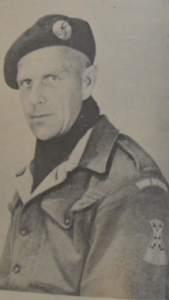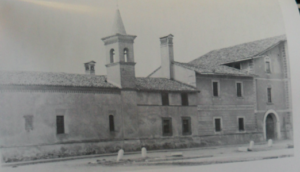Laurie du Preez
Six South African Infantry Brigade
Laurie du Preez, a policeman, enlisted in the 6th South African (Police) Brigade. He was captured in Tobruk on 21 June 1942 after the area was overrun by General Rommel’s Italo-German forces.
Although a soldier is always aware of his chances of stopping a bullet and being wounded or killed, he somehow refuses to think of the possibility of being taken prisoner. His training is apt to leave him the impression that the enemy won’t be enough to do that. A silly illogical impression.

Laurie nel 1944 (Source: L.Du Preez, Inside the cage)
Laurie was not at ease with the idea of being a PoW and immediately tried to escape during the various transfers between different Libyan camps. However, he was always recaptured. He noted: «I am a bit of fatalist, and I am convinced the Fates don’t want me to escape in this part of the world… so I will wait until we get to Italy before I make my third attempt.»
At first, he was handed to the Italians in Derna; then, he was transferred to a prison camp in Benghazi, where he experienced harsh conditions. He suffered from heat, flies, overcrowding, illnesses and lack of food and water. After a few weeks, he was loaded onto the ship Rosalino Pilo and reached Naples. From there, he was transferred via train to PG 54, Fara Sabina, near Rome, a recently opened prison camp.
After identification, South African PoWs were separated from the British and housed in different huts. Laurie later recalled that he was tormented by constant hunger during his stay in the camp. By this point, he had lost a lot of weight and was forced to scavenge among the rubbish in search of anything to eat. Moreover, he was riddled with lice, and his clothes were falling apart. He had to walk around barefoot, as he wanted to preserve his boots for a chance to escape.
A great deal of hardship was caused us on account of the slovenly methods of administration on the part of the Italians. When we asked for anything to which we were entitled and which would make the world of difference to our comfort, it took our captors four or five times longer than was necessary to comply with our request. I do not think it was purposely done to make things difficult for us. It was just the Italian system in which “domani” plays a big role. To the Italian, there is always “domani” in which to do something,

The building used as a PoW camp in Milzanello(Source: L.Du Preez, Inside the cage)
When he learned that the Italians were looking for PoWs to work in the north, Laurie volunteered and left with 200 other PoWs, including his friend Len Van Onselen and Van Onselen’s brother Lionel. He was brought to Sesto San Giovanni, on the periphery of Milan, where he was disappointed to discover that he had been assigned to a foundry and not a farm, as he had hoped. Nonetheless, his condition improved. The Italians working with him proved to be helpful and sympathetic. Many, despite the risks, brought him food to eat. «At that time, it surprised me that anyone could go to that trouble to assist someone who was a stranger to him and to expose himself to serious trouble. But I later found that to be quite a common trait in the Italian working and peasant classes.»
After a few weeks in Sesto San Giovanni, he was transferred again, this time to PG 62 Grumello del Piano. This was a transit camp for PoWs waiting to be assigned to a work camp. Lauri remembered the great number of PoWs kept in there, as well as the numerous languages spoken in the camp. In the camp, nicknamed “Inferno” by many PoWs, there was a special punishment cell for the many PoWs who attempted to escape and were then recaptured.
Laurie’s stay in PG 62 lasted only a few weeks. At the beginning of March, he was transferred to a detached camp to work on nearby farms.
Shortly after dawn the following morning, one of those huge Italian military trucks transported us outside the front gate. The first 50 us to leave for the farm passed through the gateway of 62 almost with a prayer of thanksgiving […]. We looked forward to the farm-life. We knew it was going to be tough work, but at least it was going to be a healthy life with enough to eat.
They were brought to Milzanello, a village a few kilometres outside Brescia. Laurie, in particular, worked at the Cascina Mirabella, owned by the Casali family, where he took part in harvesting the wheat. The Casali, moreover, soon proved to be anti-fascists. During his stay, Laurie worked side by side with the Italian farmers and started learning the language while his physical conditions began to improve. He enjoyed larger food rations and physical activity. However, he continued to walk barefoot to harden his feet and preserve his boots. He was in Milzanello when, on 8 September 1943, Laurie learned about the Armistice:
The following morning, we found the political situation had taken the turn many of us suspected it would. The guards didn’t take us to the farms. They addressed us where we were congregated in the yard and informed us that the Nazis had taken control of the northern parts of Italy. They told us further that a large number of Italian officers were following the Badoglio policy and had turned against the Fascists. A few minutes later, our guards were gone.
Laurie left Milzanello and hid for a few days at the Cascina Mirabella, as other PoWs were already there. A chance encounter with a young boy, who told him that many escapees were trying to reach Switzerland, made him think about this possibility, and he decided to leave and try to reach the border. He was proven right: a few days later, the Germans raided the Cascina and arrested many of the PoWs hiding there.
On 13 September 1943, Laurie began his journey north, crossing fields and hills and receiving the aid of the local farmers who fed and sheltered him in their homes. He skirted around Iseo lake and reached Mount Guglielmo, where he ran into a group of Italian deserters who gave him directions to the border.
Laurie then reached Val Camonica, planning to cross the Oglio river near the village of Darfo, aided by the village priest, who hid him in the rectory. After that, under heavy rain, he crossed Val di Scalve, where he met Angelo and his son Luigi. The former advised him to go to the village of Schilpario and ask for one of his friends who knew the mountain very well, as he often smuggled goods to Switzerland with his son.
Once in Schilpario, Laurie managed to get in touch with the two men. Guided by one of them, Carlo, he started to climb the mountains, aiming to reach the Valtellina. Unfortunately, a snowstorm hit the two, making the journey difficult and strenuous.
The uphill going now became more difficult for me. Unlike Carlo, whose years of experience had taught him how to move firmly on a snow-covered slope, I found myself continually slipping and landing on hands and knees. […] In addition to the fatigue caused by the day’s climb I now found myself developing a morbid drowsiness. It acted on me like a drug and so overpowered me that every time I slipped, I no longer landed on my hands and knees but sprawled on my face in the snow.
After joining a small group of escaped PoWs (who were with some Alpine guides) he had met during the climb with Carlo, Laurie decided to continue alone. He discovered, however, that he was running in circles and was back at Schilpario. Undaunted, Laurie was aided by another man, Ugo, who sheltered him at his house and put him in contact with a local smuggler to take him to Valtellina. A few days later, however, Laurie once again left, alone, reaching the village of Tresenda during the evening. There, he met Riccardo, a man who knew the area intimately. Riccardo had lived in Austria and was able to speak English. He offered to guide him and show him the path to reach the border. They split up only when Laurie was very close to Switzerland.
I wondered if my luck was going to hold out and whether this night – it was the early hours of Wednesday, 6 October 1943 – would be my last night as fugitive on the Italian soil.
After waiting one night, Laurie resumed his journey at dawn, crossing Poschiavo Valley. However, he did not know precisely where the border was. Suddenly, he ran into two men dressed in the Alpini uniform near a hut. Fearing they were Fascists, Laurie tried to get away, but the two ordered him to stop and come closer. Afterwards, one of them spoke to him in English, asking if he was an escaped PoW:
My spirits dropped into my shoes. The fact that the other man spoke English perfectly and that he had hit the nail right on the head caught me off balance. “Yes, I am an escaped prisoner of war” The face of the other man broke into a slow smile. “Well, you are now in Switzerland now” […] My prisoners of war troubles were over.
Camps related to this story
Sources
R. Absalom, A Strange Alliance. Aspects of escape and survival in Italy 1943-45, Firenze, Olschki, 1991 (trad. it., L’alleanza inattesa. Mondo contadino e prigionieri alleati in fuga in Italia 1943-1945, Bologna, Pendagron, 2011).
L. Du Preez, Inside the Cage, Struik, Cape Town, 1973
